Marcelo Ramos Motta
Society Ordo Templi Orientis
Jeremy Charles Ellis
Richard Gernon / Gurney
|
Upon Marcelo Ramos Motta's behalf, one Michael G. Kaplan registered the Society Ordo Templi Orientis as a legal umbrella for the O.T.O. in Nashville on 3rd February 1978. Acts of payment for this Society Ordo Templi Orientis had been processed via a 'Troll Publishing Company'. On 16th May 1978, Motta nominated a certain Jeremy Charles Ellis as representative of the true O.T.O. in London, with orders to stop the Crowleyan publications of Kenneth Grant and John Symonds. Ellis would take his commission all too literally, and in 1982 tried to set fire to the offices of the publishers Routledge & Kegan Paul in an attempt to burn Grant's books.
Ellis committed suicide in 1983. "As I experienced it, the S.O.T.O. existed solely on paper as a collection agency to pay Motta's bills.” Martin Starr in his book 'The Unknown God', Chicago 2003, p. x. Martin Starr was initiated under the auspices of Richard Gernon (see below) and rose to Director (and III°) of a mid–West O.T.O. branch on 1st November 1976. |

'Devil's disciple' pair jailedA legal controversy over the works of Aleister Crowley, the black magician who described himself as the "great beast 666" and Devil's Disciple, led to two men being charged with possessing incendiary devices, the Central Criminal Court was told yesterday. Jeremy Ellis, aged 24, became involved in occult and black magic and believed that Routledge and Keegan Paul, the publishers, had infringed the copyright of Crowley's work, the court heard. Ellis, of St Thomas's Road, Finsbury Park, north London, was jailed for 12 months for possessing an incendiary device with intent to damage or destroy property and books belonging to the publishers. Graham Sherin, aged 24, of Brunswick Place, Brighton, an electronics engineer at Brighton Polytechnic, who made four devices, was sent to prison for 15 months. He also admitted stealing equipment from the polytechnic. Both pleaded guilty. Judge Nina Lowry told them: "However misguided and however bizarre, it does not make these offences other than grave" Mr Victor Temple, for the prosecution, said Ellis belonged to the Order of the Temple of the Orient, a religious sect which claimed copyright to certain of Crowley's works. He spent a great deal of time and money in a legal action against the publishing firm but the claim was "not well founded". "It is quite apparent he continued to nurse a grievance against the publishers and it developed to such an extent he approached Sherlin who specialized in electronic engineering". Sherin constructed a number of electrical indendiary devices which he could use to start a fire at the publishers and burn the books concerned. Mr Philip Statman, for the defence, said it was a "bizarre case" and Ellis became involved with activities of the occult. Miss Eleanor Kennedy, for Sherin, said he was an "isolated man who had few friends". He met Ellis, who was a British director of the Orient Order, and waa accepted after an "initiation ceremony". Times, October 22, 1982 |
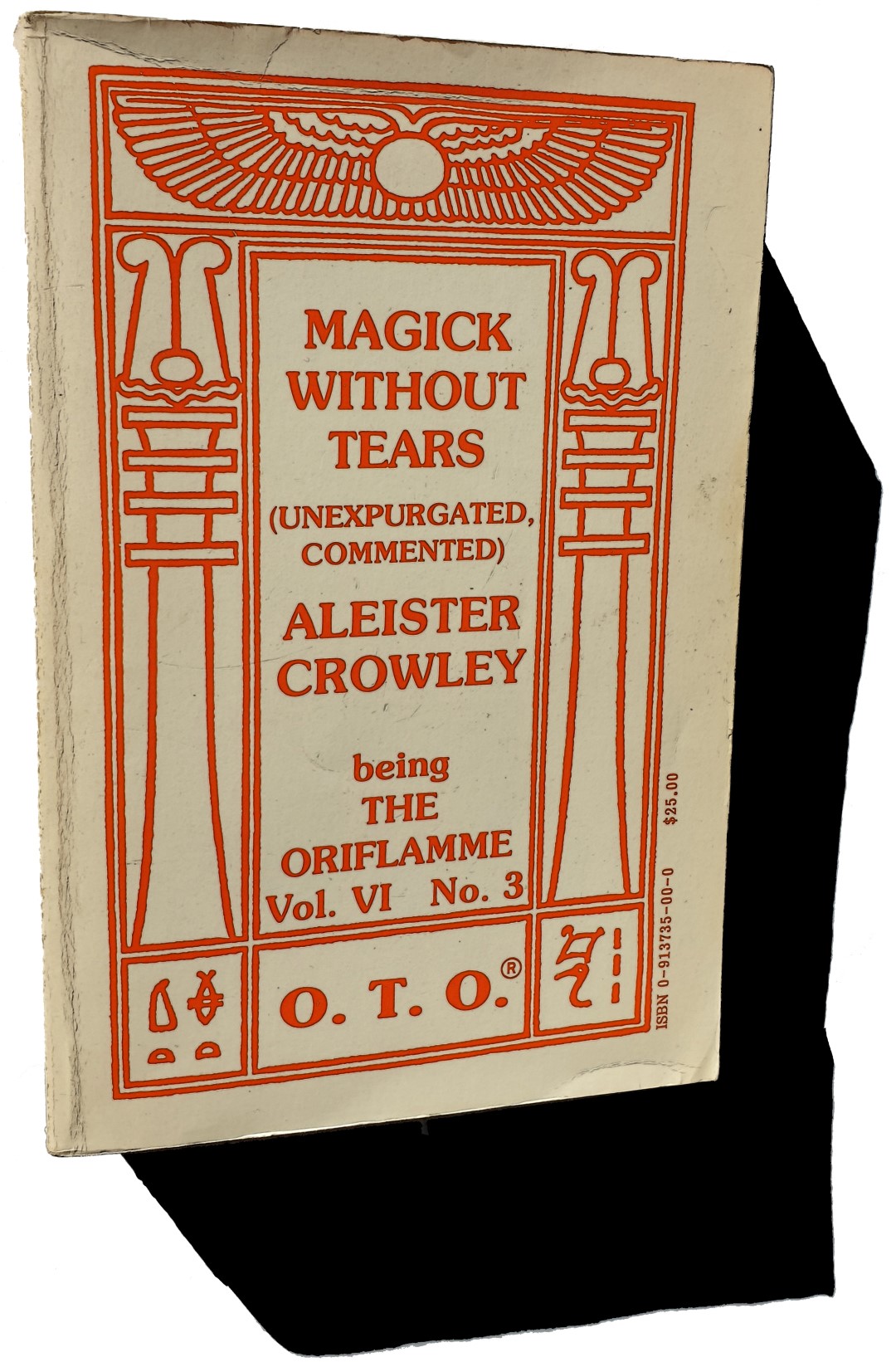
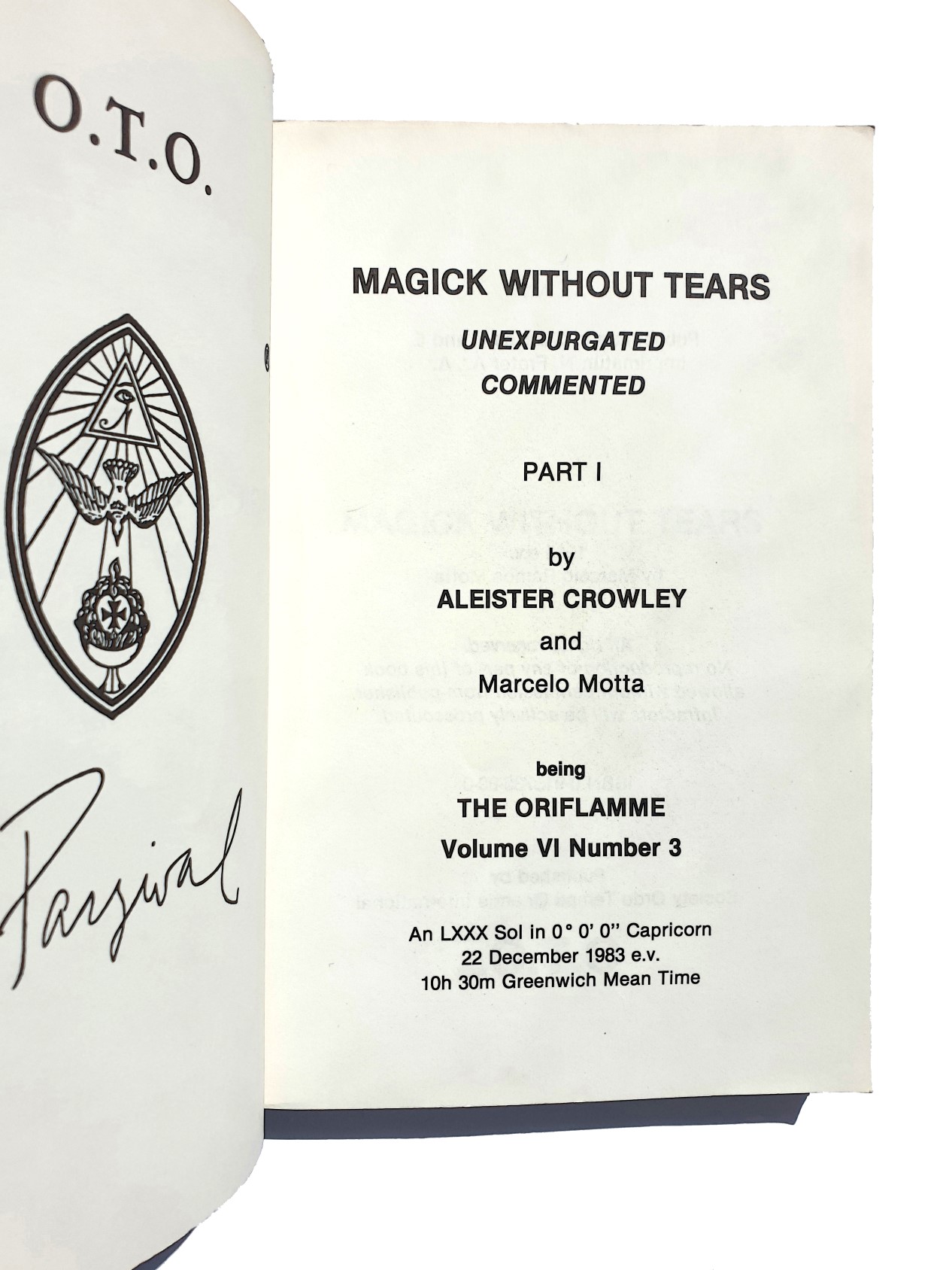
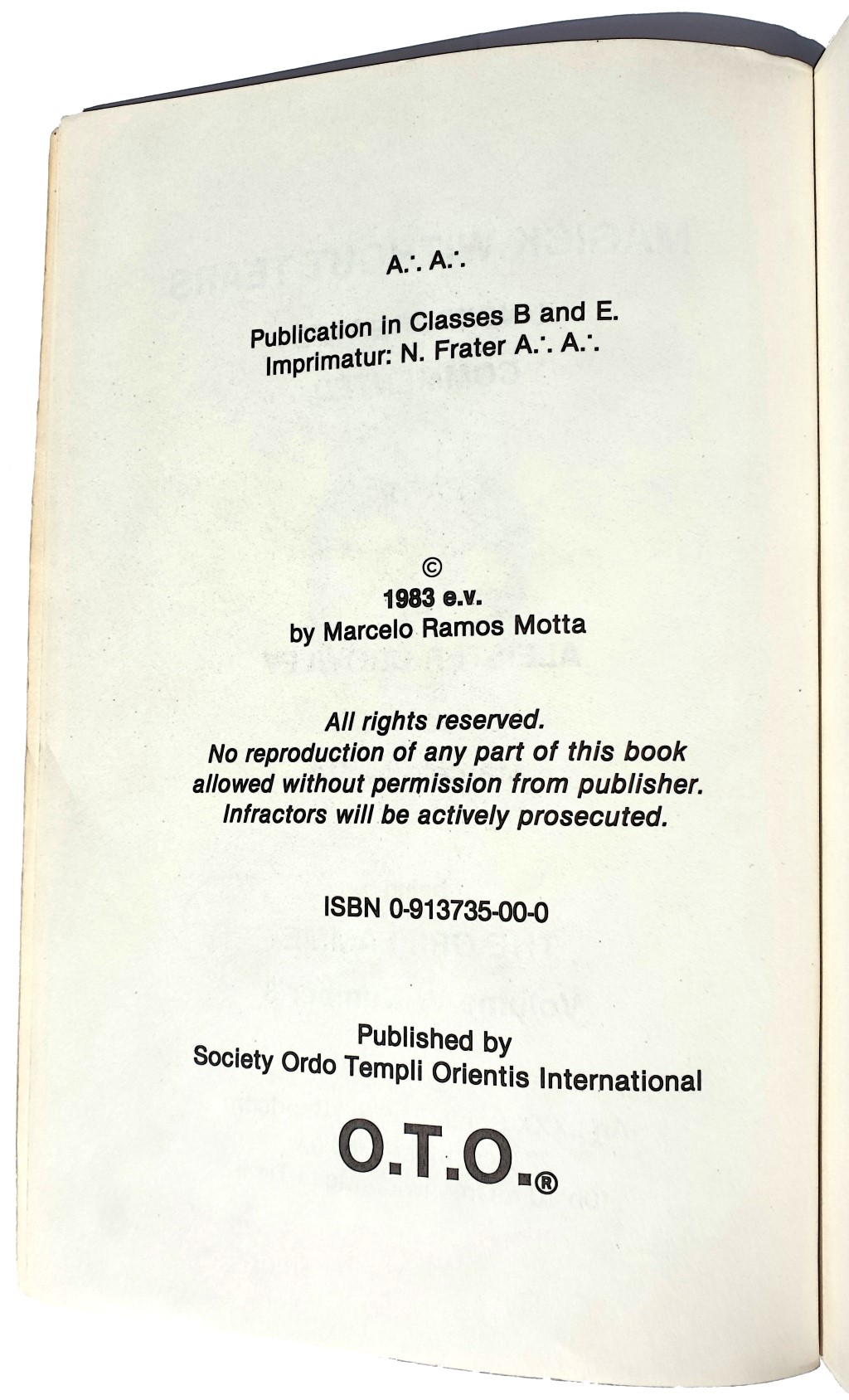
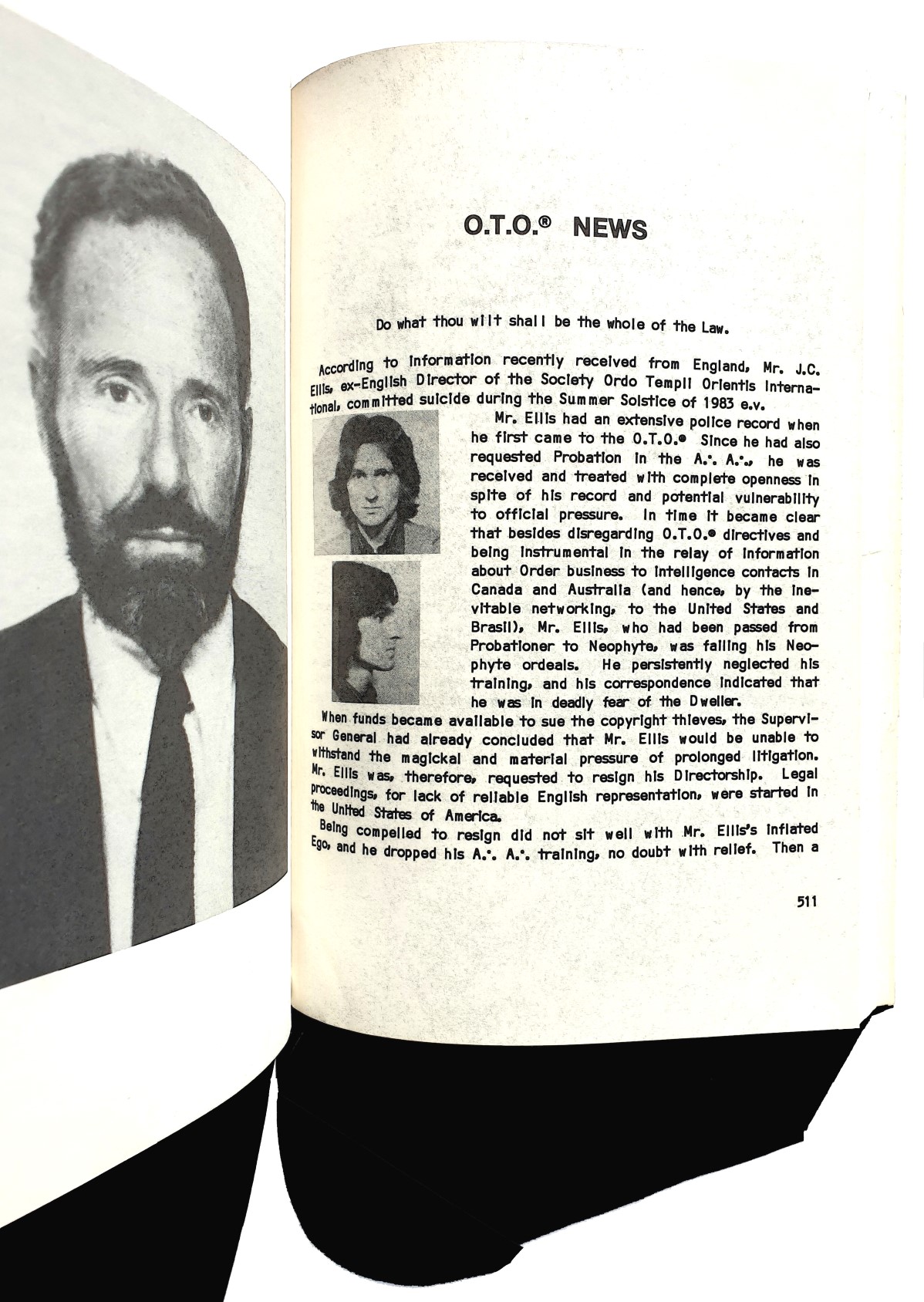
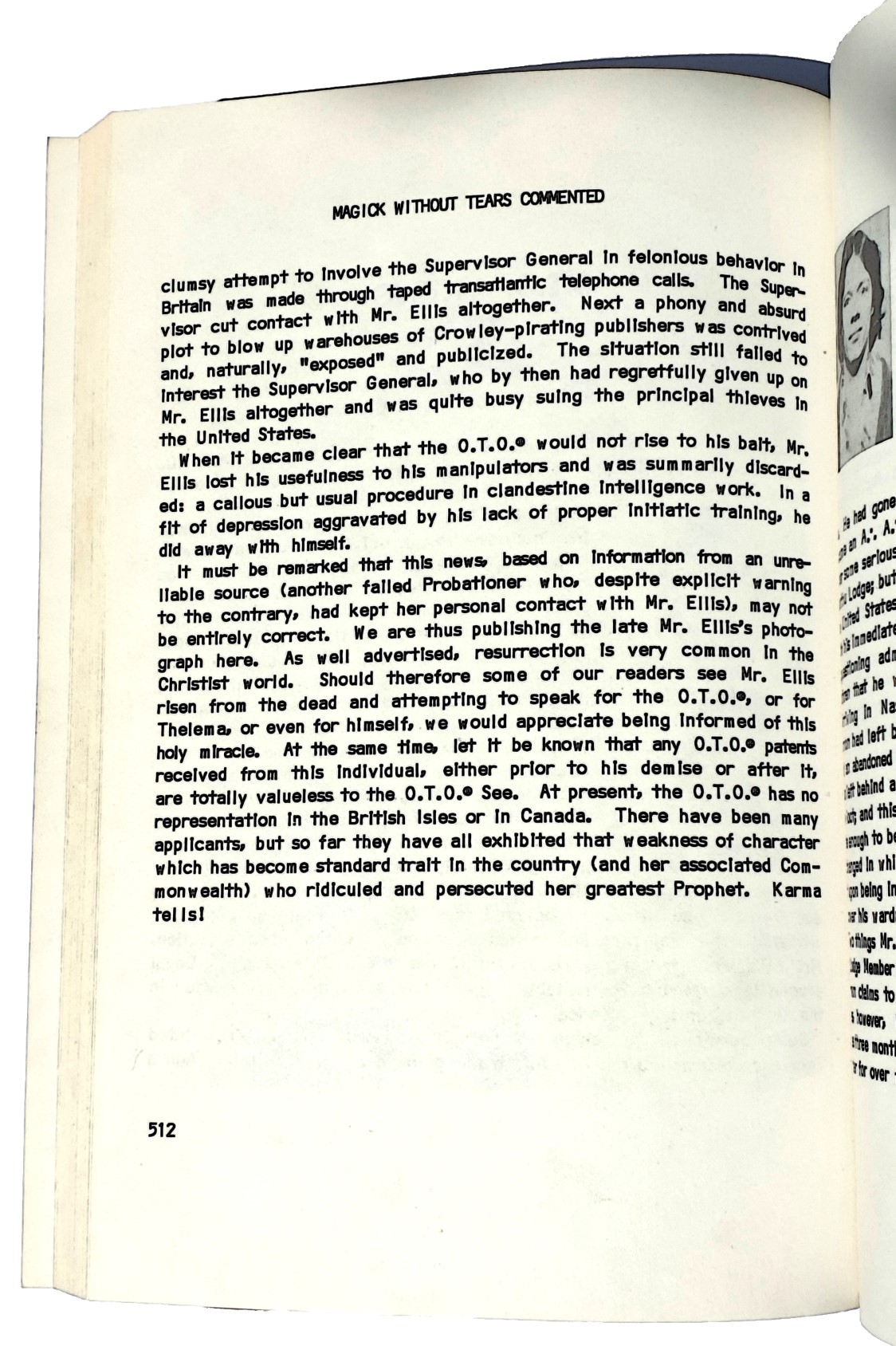
|
According to information recently received from England, Mr. J.C. Ellis, ex-English Director of the Society Ordo Templi Orientis International, committed suicide during the Summer Solstice of 1983 e.v.
Mr. Ellis had an extensive police record when he first came to the O.T.O. Since he had also requested Probation in the A.·. A.·., he was received and treated with complete openness in spite of his record and potential vulnerability to official pressure. In time it became clear that besides disregarding O.T.O. directives and being instrumental in the relay of information about Order business to Intelligence contacts in Canada and Australia (and hence, by the inevitable networking, to the United States and Brasil), Mr. Ellis, who had been passed from Probationer to Neophyte, was failing his Neophyte ordeals. He persistently neglected his training, and his correspondence indicated that he was in deadly fear of the Dweller. When funds became available to sue the copyright thieves, the Supervisor General had already concluded that Mr. Ellis would be unable to withstand the magickal and material pressure of prolonged litigation. Mr. Ellis was, therefore, requested to resign his Directorship. Legal proceedings, for lack of reliable English representation, were started in the United States of America. Being compelled to resign did not sit well with Mr. Ellis's inflated Ego, and he dropped his A.·. A.·. training, no doubt with relief. Then a clumsy attempt to involve the Supervisor General in felonious behavior in Britain was made through taped transatlantic telephone calls. The Supervisor cut contact with Mr. Ellis altogether. Next a phony and absurd plot to blow up warehouses of Crowley-pirating publishers was contrived and, naturally, "exposed" and publicized. The situation still failed to interest the Supervisor General, who by then had regretfully given up on Mr. Ellis altogether and was quite busy suing the principal thieves in the United States. When it became clear that the O.T.O. would not rise to his bait, Mr. Ellis lost his usefulness to his manipulators and was summarily discarded: a callous but usual procedure in clandestine intelligence work. In a fit of depression aggravated by his lack of proper initiatic training, he did away with himself. It must be remarked that this news, based on information from an unreliable source (another failed Probationer who, despite explicit warning to the contrary, had kept her personal contact with Mr. Ellis), may not be entirely correct. We are thus publishing the late Mr. Ellis's photograph here. As well advertised, resurrection is very common in the Christist world. Should therefore some of our readers see Mr. Ellis risen from the dead and attempting to speak for the O.T.O. or for Thelema, or even for himself, we would appreciate being informed of this holy miracle. At the same time, let it be known that any O.T.O. patents received from this individual, either prior to his demise or after it, are totally valueless to the O.T.O. See. At present, the O.T.O. has no representation in the British Isles or in Canada. There have been many applicants, but so far they have all exhibited that weakness of character which has become standard trait in the country (and her associated Commonwealth) who ridiculed and persecuted her greatest Prophet. Karma tells! Marcelo Ramos Motta: "Magick Without Tears Unexpurgated Commented Part I", "Oriflamme" VI;3, Nashville 1983, 511pp.
|
Richard Gernon / GurneyGernon served as master of Motta's S.O.T.O. in Nashville, Tennessee where he had originally gone to at the instigation of James Wasserman. He later joined the 'Caliphate' and succeeded Wasserman as Lodge Master in New York City. Gernon was a Bishop of the 'Caliphate–Ecclesia Gnostica Catholica'. He committed suicide with a drug overdose in 1989. |
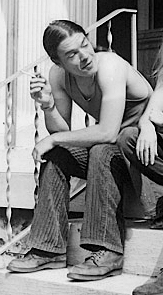
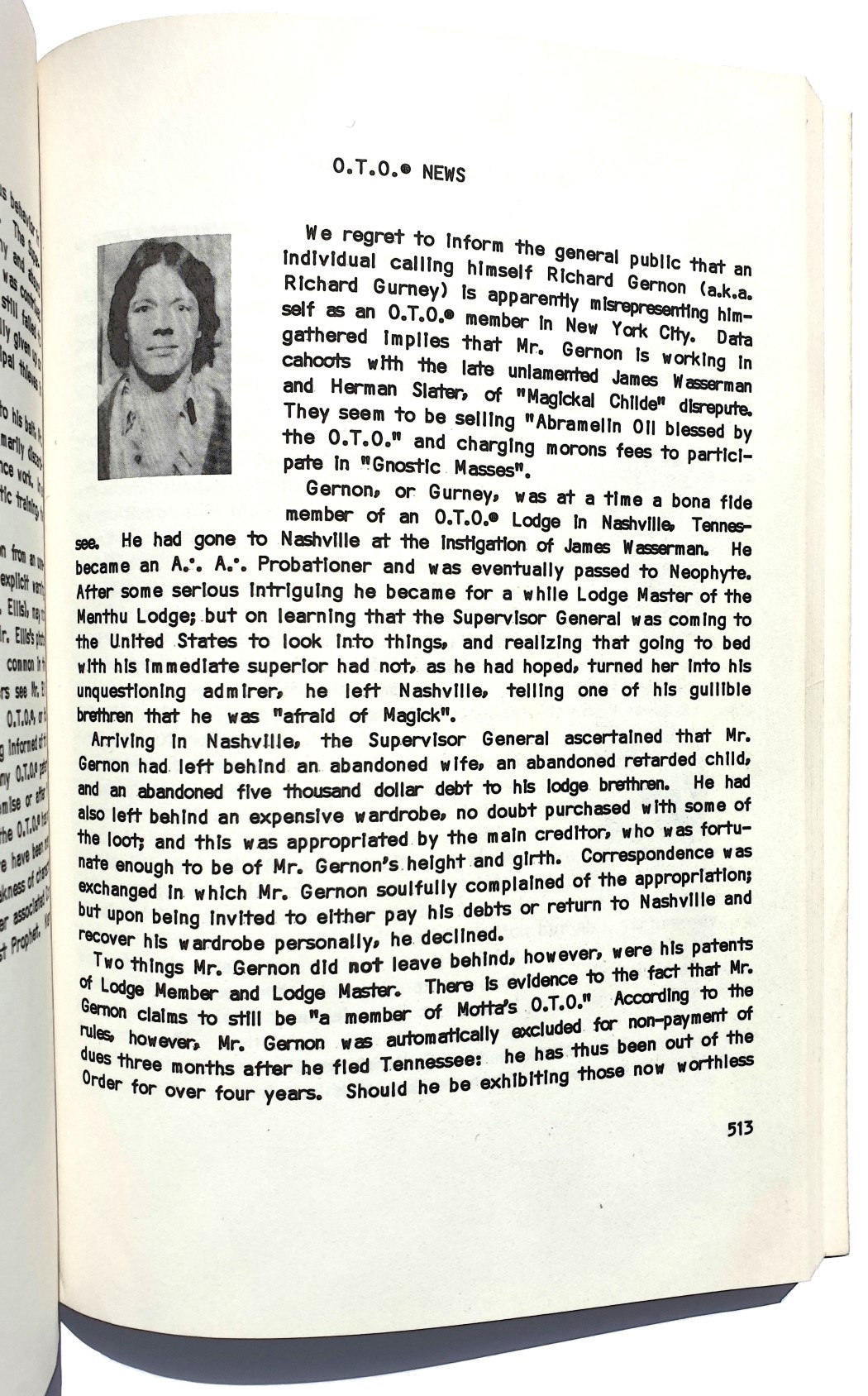
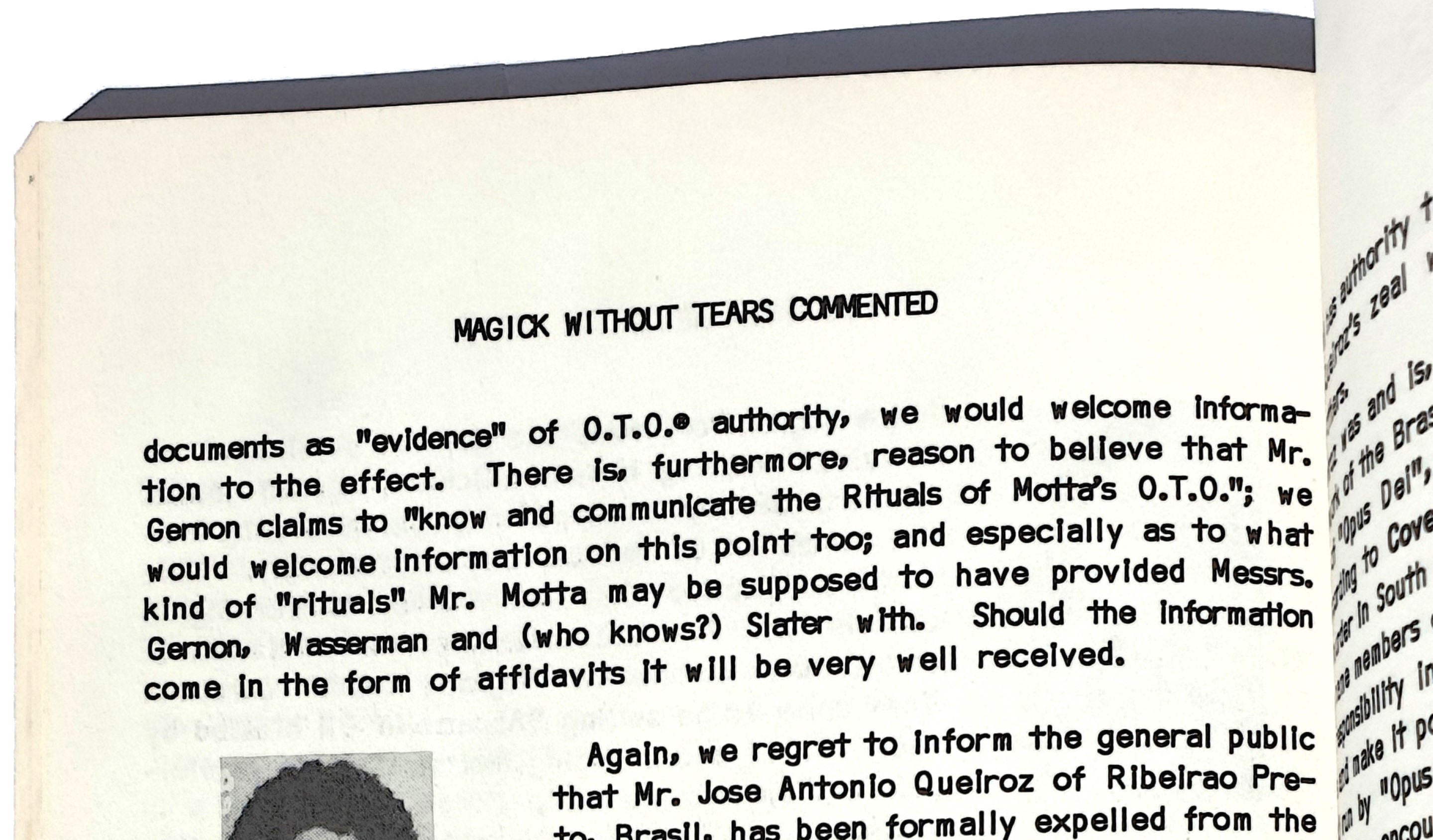
|
We regret to inform the general public that an individual calling himself Richard Gernon (a.k.a. Richard Gurney) is apparently misrepresenting himself as an O.T.O. member in New York City. Data gathered implies that Mr. Gernon is working in cahoots with the late unlamented James Wasserman and Herman Slater, of "Magickal Childe" disrepute. They seem to be selling "Abramelin Oil blessed by the O.T.O." and charging morons fees to participate in "Gnostic Masses".
Gernon, or Gurney, was at a time a bona fide member of an O.T.O. Lodge in Nashville, Tennessee. He had gone to Nashville at the instigation of James Wasserman. He became an A.·. A.·. Probationer and was eventually passed to Neophyte. After some serious intriguing he became for a while Lodge Master of the Menthu Lodge; but on learning that the Supervisor General was coming to the United States to look into things, and realizing that going to bed with his immediate superior had not, as he had hoped, turned her into his unquestioning admirer, he left Nashville, telling one of his gullible brethren that he was "afraid of Magick". Arriving in Nashville, the Supervisor General ascertained that Mr. Gernon had left behind an abandoned wife, an abandoned retarded child, and an abandoned five thousand dollar debt to his lodge brethren. He had also left behind an expensive wardrobe, no doubt purchased with some of the loot; and this was appropriated by the main creditor, who was fortunate enough to be of Mr. Gernon's height and girth. Correspondence was exchanged in which Mr. Gernon soulfully complained of the appropriation; but upon being invited to either pay his debts or return to Nashville and recover his wardrobe personally, he declined. Two things Mr. Gernon did not leave behind, however, were his patents of Lodge Member and Lodge Master. There is evidence to the fact that Mr. Gernon claims to still be "a member of Motta's O.T.O." According to the rules however, Mr. Gernon was automatically excluded for non-payment of dues three months after he fled Tennessee: he has thus been out of the Order for over four years. Should he be exhibiting those now worthless documents as "evidence" of O.T.O. authority, we would welcome information to the effect. There is, furthermore, reason to believe that Mr. Gernon claims to "know and communicate the Rituals of Motta's O.T.O."; we would welcome information on this point too; and especially as to what kind of "rituals" Mr. Motta may be supposed to have provided Messrs. Gernon, Wasserman and (who knows?) Slater with. Should the information come in the form of affidavits it will be very well received. Marcelo Ramos Motta: "Magick Without Tears Unexpurgated Commented Part I", "Oriflamme" VI;3, Nashville 1983, 513pp. IN THE UNITED STATES DISTRICT COURT |
|
O.T.O. Phänomen Navigation | Inhalt | Fragen und Antworten zum O.T.O. | Liste der print-Bücher | mail
Was ist neu? auf der O.T.O. Phänomen Website?
|
|
|

